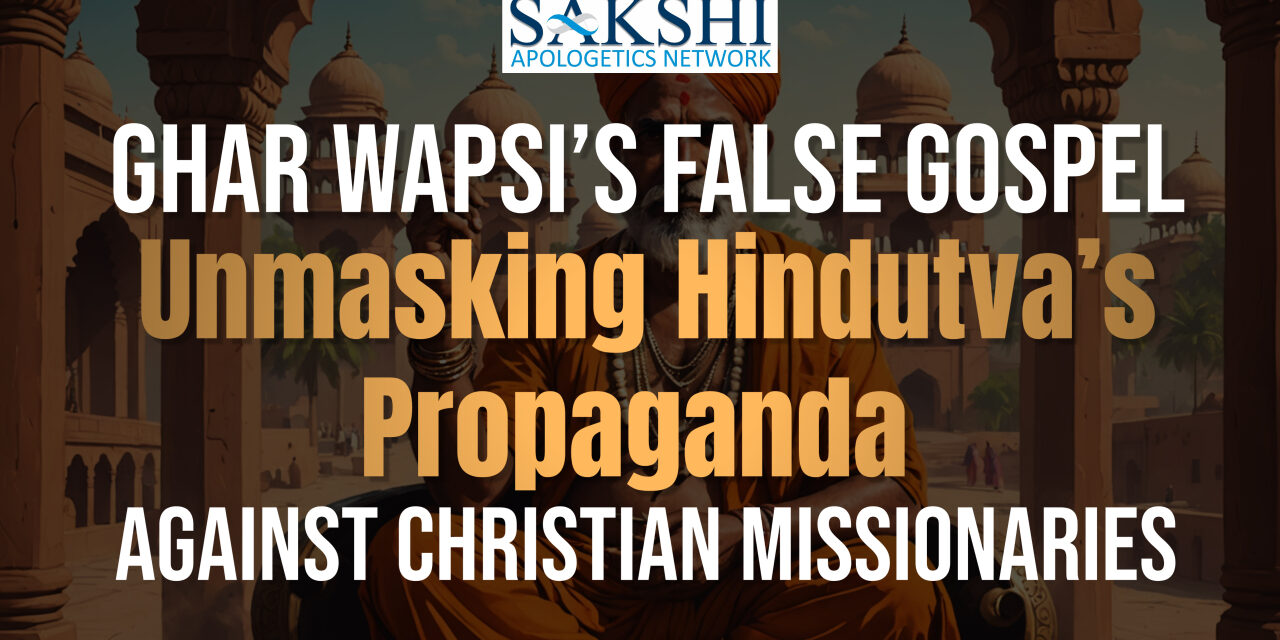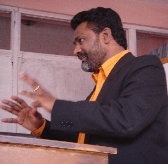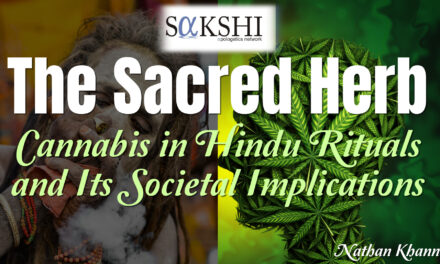The “Ghar wapsi” (homecoming) campaigns, orchestrated by Hindutva groups such as the Rashtriya Swayamsevak Sangh (RSS), Vishva Hindu Parishad (VHP), and Bajrang Dal, have cast a shadow over India’s religious landscape by accusing Christian missionaries of forcibly converting Hindus. These initiatives, which seek to “reconvert” Christians to Hinduism, portray Christianity as a foreign threat that erodes India’s cultural identity. Yet, the irony is stark: ghar wapsi often employs the very coercion it condemns, inciting violence and division while misrepresenting the Christian mission. From a Christian apologetics perspective, this article refutes these baseless accusations, exposes the hypocrisy of ghar wapsi, and defends the biblical mandate for missionary work as an expression of love, not force. Drawing on Hindu and Bible scriptures, alongside documented evidence, we highlight the harm caused by this propaganda and call for a return to truth and mutual respect in India’s pluralistic society.
This article argues that ghar wapsi is a distortion of spiritual truth, rooted in political motives rather than the universal principles of faith found in both Christianity and authentic Hindu teachings. By examining the theological, historical, and social dimensions of this issue, we aim to dismantle the myth of forceful conversions, affirm the voluntary nature of Christian faith, and challenge the coercive tactics of Hindutva groups, which betray India’s constitutional commitment to religious freedom under Article 25.
The Ghar Wapsi Campaign: Origins and Ideology
Defining Ghar Wapsi
Ghar wapsi, meaning “homecoming,” is a Hindutva-driven movement to reconvert Christians, Muslims, and others to Hinduism, based on the claim that all Indians are inherently Hindu and that conversion to other faiths is a betrayal of cultural roots. Launched with renewed vigor in 2014 by the VHP and Bajrang Dal, these campaigns target marginalized communities, particularly Adivasis and Dalits, through public shuddhi (purification) rituals. These events are framed as a return to an “ancestral faith,” but evidence suggests coercion, intimidation, and inducements like promises of land, jobs, or ration cards are common.
For instance, in Agra in December 2014, the VHP claimed to have reconverted 200 Christians, alleging they were originally Hindus. Investigations revealed that many participants were lured with promises of government benefits, and some were unaware they were part of a reconversion ceremony. Such tactics mirror the accusations leveled against Christian missionaries, exposing a glaring double standard.
The Hindutva Ideology Fueling Ghar Wapsi
Hindutva, articulated by Vinayak Damodar Savarkar in 1923, equates Indian identity with Hindu culture, religion, and territory. Organizations like the RSS, VHP, and Bajrang Dal promote this ideology, framing Christians as outsiders despite their presence in India since the first century, as evidenced by the Thomas Christians of Kerala. Ghar wapsi campaigns portray missionaries as agents of Western imperialism, accusing them of using force, fraud, or allurements to convert Hindus. This narrative has gained political traction under the Bharatiya Janata Party (BJP), which has governed since 2014, often aligning with Hindutva groups to consolidate power.
Leaders like Pravin Togadia of the VHP justify ghar wapsi as a defense of Hindu culture, yet their rhetoric ignores the contributions of Christians to India’s education, healthcare, and social reform. Institutions like the Christian Medical College in Vellore and St. Stephen’s College in Delhi serve millions, including Hindus, without mandating conversion, contradicting the Hindutva narrative of missionary malfeasance.
The Harm of Ghar Wapsi Propaganda
Incitement of Violence
Ghar wapsi’s rhetoric has directly fueled violence against Christians. By portraying missionaries as threats, Hindutva groups incite mobs to target Christian communities. The United Christian Forum (UCF) documented 687 incidents of anti-Christian violence in 2023, with 585 cases reported by September 2024. These include church vandalism, assaults on pastors, and false arrests under anti-conversion laws. In Chhattisgarh in 2023, Bajrang Dal-led mobs attacked Christian households, burned Bibles, and accused families of conversions without evidence. In Uttar Pradesh, a 2021 prayer meeting in Sultanpur was disrupted by police following VHP complaints, with attendees detained on baseless charges.
The 2008 Kandhamal riots in Odisha, triggered by Hindutva accusations of Christian involvement in a Hindu monk’s murder, resulted in 39 deaths, over 395 churches destroyed, and thousands displaced. The 1999 murder of Australian missionary Graham Staines and his two sons by Bajrang Dal members, justified as a response to alleged conversions, remains a chilling example of propaganda-driven violence. Such acts contradict the biblical call to peace: “Blessed are the peacemakers, for they shall be called sons of God” (Matthew 5:9, ESV).
Social and Economic Marginalization
Ghar wapsi campaigns marginalize Christians by pressuring them to renounce their faith. In tribal areas, Adivasi Christians face ostracism, loss of land rights, or denial of government benefits unless they participate in reconversion rituals. In Jharkhand, reports indicate Christians were coerced into shuddhi ceremonies under threat of eviction. This violates Article 25 of the Indian Constitution, which guarantees the right to “profess, practice, and propagate” religion.
The Foreign Contribution Regulation Act (FCRA) has been used to restrict Christian organizations, as seen in the 2021 denial of a license to Mother Teresa’s Missionaries of Charity based on unproven conversion allegations. This limits their ability to provide services like schools and hospitals, which benefit all communities, reinforcing the false narrative that missionary work is solely about conversion.
Political Exploitation
Ghar wapsi is a political tool to polarize voters. In states like Chhattisgarh and Uttar Pradesh, the BJP leverages conversion fears to rally Hindu support, particularly in tribal areas where Christians form a small minority (1.9% in Chhattisgarh per the 2011 Census). By scapegoating missionaries, Hindutva groups distract from issues like poverty and unemployment, undermining India’s secular ethos. Mahatma Gandhi’s vision of unity—“Religions are different roads converging to the same point”—is betrayed by this divisive strategy.
A Christian Apologetic Response
The Biblical Mandate for Mission
Christian missionary work is rooted in the Great Commission: “Go therefore and make disciples of all nations, baptizing them in the name of the Father and of the Son and of the Holy Spirit” (Matthew 28:19, ESV). This mandate emphasizes sharing the Gospel through love and persuasion, not coercion. The Bible underscores the voluntary nature of faith: “For we walk by faith, not by sight” (2 Corinthians 5:7, ESV). Faith must be a personal choice, as Jesus illustrates: “Behold, I stand at the door and knock. If anyone hears my voice and opens the door, I will come in to him” (Revelation 3:20, ESV).
Missionaries in India often focus on social service, reflecting Jesus’ command: “Love your neighbor as yourself” (Mark 12:31, ESV). Christian institutions like St. John’s Medical College serve millions, regardless of faith, without requiring conversion. This aligns with the biblical call to serve selflessly: “Let your light shine before others, so that they may see your good works and give glory to your Father who is in heaven” (Matthew 5:16, ESV).
Refuting Forceful Conversion Allegations
The charge of forceful conversion lacks evidence. The 2011 Census shows Christians constitute only 2.3% of India’s population, with minimal growth in states like Gujarat (0.52%) despite decades of missionary presence. The 1956 Niyogi Committee Report, often cited by Hindutva groups, alleged misconduct but provided no verifiable proof of widespread coercion. No significant convictions have been secured under anti-conversion laws in states like Madhya Pradesh or Uttar Pradesh, suggesting these allegations are politically motivated.
Conversions often occur voluntarily among marginalized groups. Adivasis and Dalits, facing caste oppression, embrace Christianity’s message of equality: “There is neither Jew nor Greek, slave nor free, male nor female, for you are all one in Christ Jesus” (Galatians 3:28, ESV). Testimonies, like that of Laxman Meena in Rajasthan, who found healing and community in Christianity, reflect personal conviction, not coercion.
The Hypocrisy of Ghar Wapsi
Ghar wapsi campaigns employ the coercive tactics Hindutva groups accuse missionaries of using. In Chhattisgarh in 2023, Bajrang Dal claimed to have reconverted 15 families, but reports indicate participants faced threats of violence or loss of livelihood. In Odisha, Adivasi Christians were offered land titles to participate in shuddhi rituals. This hypocrisy is condemned in Scripture: “Why do you see the speck that is in your brother’s eye, but do not notice the log that is in your own eye?” (Matthew 7:3, ESV). By condemning missionary “inducements” while offering their own, Hindutva groups undermine their credibility.
Hindu Scriptures and the Betrayal of Pluralism
Certain Hindu scriptures advocate a pluralism that ghar wapsi betrays. The Rig Veda declares, “Ekam sat vipra bahudha vadanti” (Truth is one, though the wise call it by many names) (Rig Veda 1.164.46), suggesting openness to diverse spiritual paths. The Bhagavad Gita reinforces this: “In whatever way men approach Me, even so do I reward them” (Bhagavad Gita 4:11). These teachings align with India’s historical coexistence of Jainism, Buddhism, and Sikhism alongside Hinduism.
However, Hindutva’s ghar wapsi campaigns impose a monolithic Hindu identity, contradicting the inclusivity of figures like Swami Vivekananda, who said, “We believe not only in universal toleration, but we accept all religions as true” (1893 Parliament of the World’s Religions). By coercing reconversions, Hindutva groups deviate from this pluralistic heritage, fostering division over unity.
Evidence Against Forced Conversions
Legal and Statistical Data
Anti-conversion laws in states like Uttar Pradesh and Gujarat prescribe penalties for forced conversions, yet no significant convictions have been recorded, indicating a lack of evidence. In 2022, the Supreme Court affirmed that voluntary conversions are protected under Article 25, but forced conversions violate religious freedom. The absence of convictions suggests allegations are often fabricated for political gain.
The 2011 Census shows Christians remain a small minority (2.3%), with negligible growth in states like Jharkhand (4.3%) despite missionary presence. A 2019 study by Nilay Saiya and Stuti Manchanda found that anti-conversion laws correlate with increased violence against Christians, suggesting these laws embolden vigilante groups behind ghar wapsi.
Case Studies
1- Agra, 2014: The VHP’s claim of reconverting 200 Christians was debunked when participants revealed they were lured with ration cards, not spiritual conviction.
2- Kandhamal, 2008: Hindutva propaganda blaming Christians for a monk’s murder led to riots, with no evidence of missionary coercion found.
3- Chhattisgarh, 2023: Bajrang Dal’s ghar wapsi events involved threats to Adivasi Christians, contradicting their anti-coercion stance.
Independent Reports
Organizations like Persecution Relief and the UCF document that most anti-Christian violence stems from unverified conversion allegations. The 1999 murder of Graham Staines and his sons by Bajrang Dal members, justified as a response to alleged conversions, exemplifies the deadly consequences of this propaganda.
A Call to Truth and Righteousness
The ghar wapsi campaign, driven by Hindutva’s exclusivist ideology, stands as a grave distortion of spiritual truth, wielding accusations of forceful conversion to justify coercion and violence against Christians. This propaganda not only misrepresents the Christian mission but also betrays the pluralistic ethos found in certain Hindu scriptures. The Rig Veda’s declaration, “Ekam sat vipra bahudha vadanti” (Rig Veda 1.164.46), calls for recognition of truth in diverse forms, yet Hindutva’s aggressive reconversion tactics impose a singular identity that stifles India’s rich religious diversity. Similarly, the Bhagavad Gita’s promise, “In whatever way men approach Me, even so do I reward them” (Bhagavad Gita 4:11), is undermined by ghar wapsi’s intolerance, which seeks to erase rather than embrace differences.
To those who propagate this narrative, we speak with clarity and conviction, rooted in Scripture: “You shall not bear false witness against your neighbor” (Exodus 20:16, ESV). The accusations of forceful conversion lack evidence, as seen in the absence of convictions under anti-conversion laws and the static Christian population of 2.3% in the 2011 Census. By accusing missionaries of coercion while employing threats and inducements in ghar wapsi, Hindutva groups fall under the condemnation of Jesus’ words: “Woe to you, scribes and Pharisees, hypocrites! For you clean the outside of the cup and the plate, but inside they are full of greed and self-indulgence” (Matthew 23:25, ESV). This hypocrisy fuels division, incites violence, and dishonors the shared pursuit of truth that both Hindu and Christian traditions uphold.
We call upon Hindutva leaders to cease this campaign of falsehood and embrace the principle of satya (truth), which their own scriptures extol: “Satyam eva jayate” (Truth alone triumphs) (Mundaka Upanishad 3.1.6). The path forward lies not in coercion but in dialogue, not in division but in mutual respect, as India’s Constitution affirms the right to “profess, practice, and propagate” religion (Article 25). Christians will continue to serve all Indians, as Jesus commanded: “Love your enemies and pray for those who persecute you” (Matthew 5:44, ESV). We invite our Hindu brothers and sisters to reject the false gospel of ghar wapsi and join us in building a nation where truth and love prevail.
The True Ghar Wapsi: Why Jesus Is the Only Way
The true “homecoming” is not a return to an imposed cultural identity but a journey to the eternal truth found in Jesus Christ. The Bible declares, “Jesus said to him, ‘I am the way, and the truth, and the life. No one comes to the Father except through me’” (John 14:6, ESV). This is not a call to cultural supremacy but an invitation to all people, regardless of background, to find salvation through Christ’s sacrifice. The ghar wapsi of Hindutva offers a temporal identity rooted in earthly traditions, but Christianity offers an eternal home in God’s kingdom: “In my Father’s house are many rooms. If it were not so, would I have told you that I go to prepare a place for you?” (John 14:2, ESV).
While Hinduism’s scriptures, like the Upanishads, seek truth through philosophical inquiry, they acknowledge the limitations of human understanding: “Neti neti” (Not this, not that) (Brihadaranyaka Upanishad 2.3.6), pointing to the ineffable nature of ultimate reality. Christianity provides the definitive answer in Jesus, who fulfills the longing for truth: “And you will know the truth, and the truth will set you free” (John 8:32, ESV). The Christian mission is not about erasing culture but about offering salvation, as seen in the voluntary faith of millions, including Adivasis and Dalits, who find dignity in Christ’s promise: “There is neither Jew nor Greek, slave nor free, male nor female, for you are all one in Christ Jesus” (Galatians 3:28, ESV).
The true ghar wapsi is a return to God through Jesus, the only way to eternal life. We invite all to consider this truth, not through coercion but through the love and witness of Christ’s followers, who serve India’s poorest and most marginalized, reflecting His command: “By this all people will know that you are my disciples, if you have love for one another” (John 13:35, ESV).





